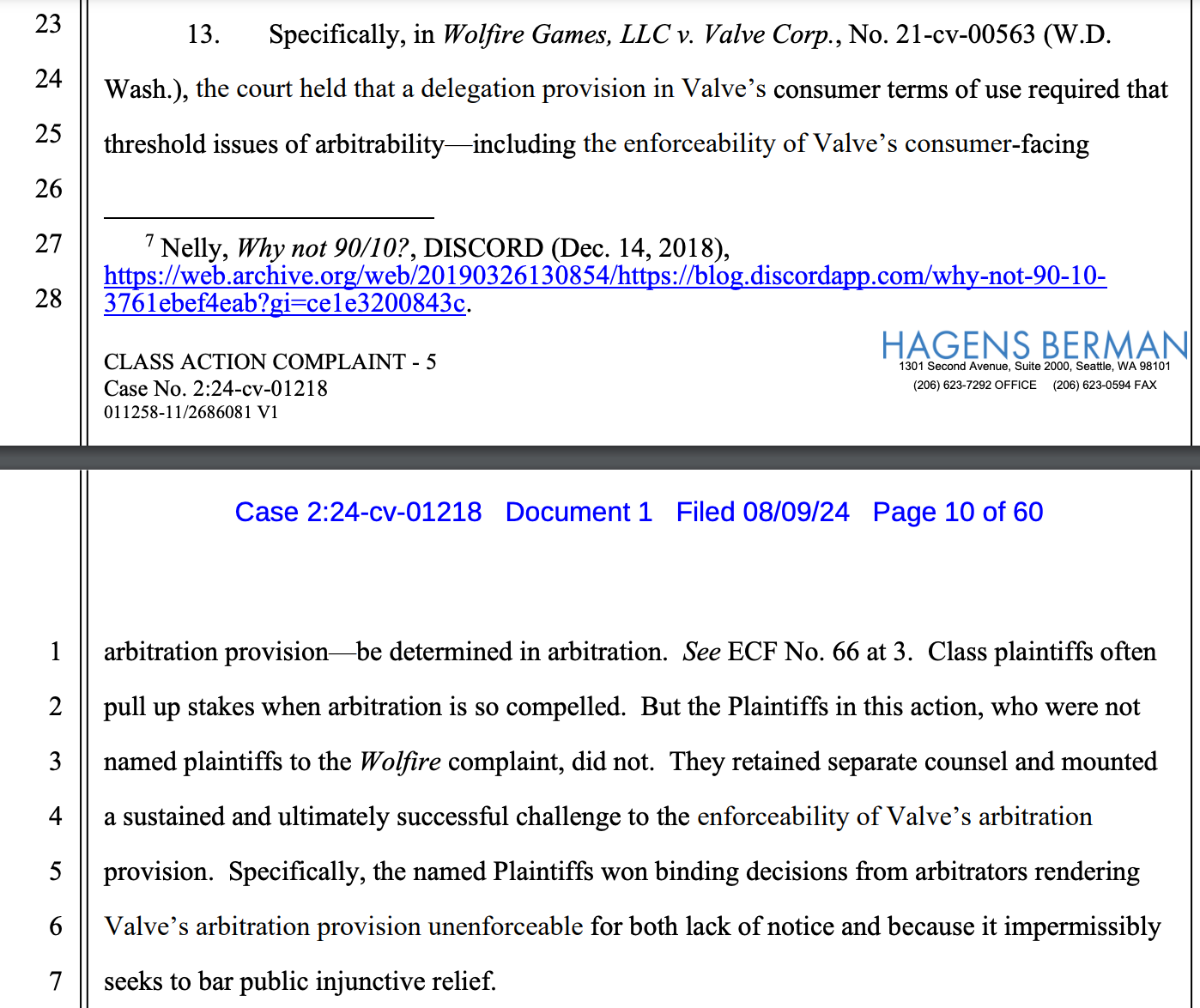In a pretty notable terms of service update, Valve has removed the forced arbitration clause from Steam’s subscriber agreement, meaning users will now have the ability to sue Valve over disputes, and will also have greater ability to file class-action lawsuits against the company.
“We’ve eliminated the requirement that disputes be resolved by individual arbitration. As always, we encourage you to contact Steam Support when you have any issues, as that will nearly always be the best way to reach a solution,” Valve wrote in an update on its website. “But if that doesn’t work, the updated Steam Subscriber Agreement (SSA) now provides that any disputes are to go forward in court instead of arbitration. We’ve also removed the class action waiver, as well as the cost and fee-shifting provisions, that were in prior versions of the SSA.”
Forced arbitration or “binding arbitration” provisions have become incredibly commonplace in terms of service agreements for nearly any product you buy, service you use, or subscription you have. They are also widely used in employment contracts, and essentially state that by using a product, you are waiving your ability to sue the company. Instead, any dispute must be settled by a third-party arbitrator in an extralegal process that is usually cheaper and more favorable to companies than the U.S. court system.
Before the update, Steam’s subscriber agreement had this clause:
“YOU AND VALVE AGREE TO RESOLVE ALL DISPUTES AND CLAIMS BETWEEN US IN INDIVIDUAL BINDING ARBITRATION. THAT INCLUDES, BUT IS NOT LIMITED TO, ANY CLAIMS ARISING OUT OF OR RELATING TO: (i) ANY ASPECT OF THE RELATIONSHIP BETWEEN US; (ii) THIS AGREEMENT; OR (iii) YOUR USE OF STEAM, YOUR ACCOUNT, HARDWARE OR THE CONTENT AND SERVICES. IT APPLIES REGARDLESS OF WHETHER SUCH CLAIMS ARE BASED IN CONTRACT, TORT, STATUTE, FRAUD, UNFAIR COMPETITION, MISREPRESENTATION OR ANY OTHER LEGAL THEORY, AND INCLUDES ALL CLAIMS BROUGHT ON BEHALF OF ANOTHER PARTY.
An arbitration is a proceeding before a neutral arbitrator, instead of before a judge or jury. Arbitration is less formal than a lawsuit in court, and provides more limited discovery. It follows different rules than court proceedings, and is subject to very limited review by courts. The arbitrator will issue a written decision and provide a statement of reasons if requested by either party. YOU UNDERSTAND THAT YOU AND VALVE ARE GIVING UP THE RIGHT TO SUE IN COURT AND TO HAVE A TRIAL BEFORE A JUDGE OR JURY.”
Notably, Valve wrote that the arbitration terms did not apply to “Intellectual Property, Unauthorized Use, Piracy, or Theft,” meaning Valve could still sue you, but you could not sue Valve.
After the update, it now reads: “You and Valve agree that all disputes and claims between you and Valve (including Any dispute or claim that arose before the existence of this or any prior agreement shall be commenced and maintained exclusively in any state or federal court located in King County, Washington.”
The Electronic Frontier Foundation has called forced arbitration “unfair to customers in virtually any context.” Very recently, for example, Disney attempted to argue that because a widower had “agreed” to a forced arbitration clause by subscribing to Disney+, he couldn’t bring a wrongful death suit against the company after his wife died after suffering an allergic reaction at a Disney theme park.
“When the customer has no negotiating power, arbitration is inherently biased in favor of the vendor,” the EFF wrote.
Valve did not say exactly why it got rid of its forced arbitration clause. But the company is currently being sued in a class action lawsuit in Washington state over the dominance of the Steam platform and over claims that it has overcharged for some games. The plaintiffs in that case actually went to arbitration and convinced an arbitrator that the forced arbitration clause should not apply to them, and were allowed to sue.
The plaintiffs in that case “retained separate counsel and mounted a sustained and ultimately successful challenge to the enforceability of Valve’s arbitration provision. Specifically, the named Plaintiffs won binding decisions from arbitrators rendering Valve’s arbitration provision unenforceable for both lack of notice and because it impermissibly seeks to bar public injunctive relief,” the class action lawsuit against Valve reads. Valve has not yet filed any arguments in that case.

Forced arbitration clauses have also become particularly common in employment contracts, and have been used to silence employees (primarily women) who were sexually abused or discriminated against at work. In the aftermath of a series of high-profile cases where women couldn’t sue because of these clauses, California passed a law banning mandatory arbitration in employment contracts in the state, which earlier this year was struck down by a federal court.
Valve did not immediately respond to a request for comment.


